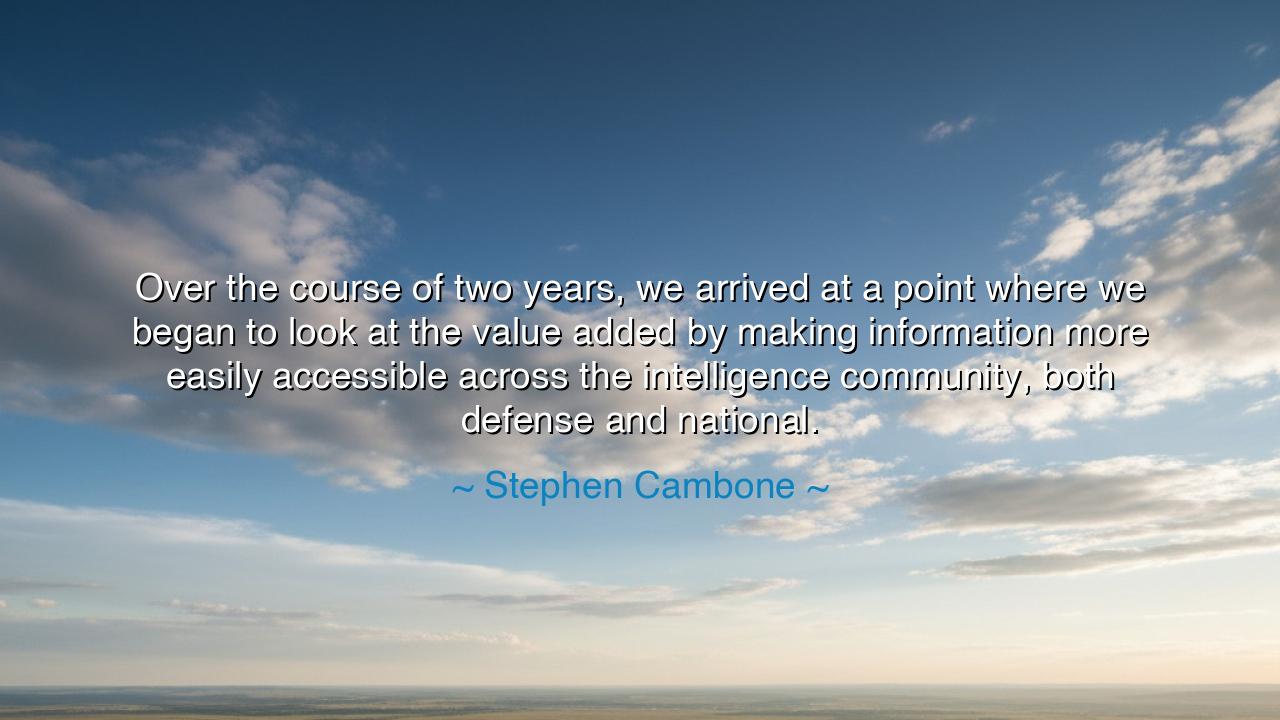
Over the course of two years, we arrived at a point where we
Over the course of two years, we arrived at a point where we began to look at the value added by making information more easily accessible across the intelligence community, both defense and national.






In the unfolding story of human understanding, the sharing of knowledge has always marked the difference between stagnation and progress. The quote by Stephen Cambone speaks to this timeless truth: that the value of intelligence, whether in matters of defense or national purpose, grows only when it flows freely between minds and institutions. “Over the course of two years,” Cambone says, “we arrived at a point where we began to look at the value added by making information more easily accessible.” These words are not about machines or systems alone—they are about the evolution of awareness, the awakening that comes when barriers are broken and light is allowed to reach where once there was shadow.
In ancient times, knowledge was hoarded like gold. Kings guarded their archives, priests concealed sacred writings, and scholars spoke in riddles so that only the initiated might understand. Yet time and again, civilizations that shared their wisdom—like the Greeks with their open academies, or the scholars of Baghdad’s House of Wisdom—flourished beyond measure. Cambone’s reflection belongs to this eternal lineage. His insight, born of two years of deep collaboration within the intelligence community, reveals a shift in perspective: that information’s power lies not in its secrecy alone, but in its connection. True intelligence emerges not from isolated minds, but from networks of shared vision.
To understand the gravity of his words, one might look to the story of Alan Turing and the Allied cryptographers of Bletchley Park during World War II. Each expert brought their own fragment of understanding—the mathematician his equations, the linguist his codes, the engineer his machines. It was only when their work became interconnected, when barriers of hierarchy and ego dissolved, that the impossible was achieved: the breaking of the Enigma code. Their victory was not merely one of intellect, but of collaboration, a triumph that came when knowledge was made accessible to those who could use it wisely. Cambone’s message echoes that same spirit—intelligence that remains divided is half-blind; but when shared, it becomes vision itself.
The value added, as he calls it, is not merely a technical improvement. It is a moral awakening. When those entrusted with knowledge recognize that its purpose is service—to nation, to truth, to humanity—they transcend bureaucracy and touch something divine. Cambone’s journey over those two years mirrors the journey of enlightenment itself: from isolation to unity, from fragments of understanding to a complete and coherent vision. He reminds us that the measure of intelligence is not what one knows, but what one is willing to share for the greater good.
Yet this lesson extends far beyond the halls of government. In every walk of life, people hold pieces of knowledge, wisdom, and experience that could lift others if only they were shared. A teacher who hides their best methods out of pride, a leader who withholds information to preserve control, a friend who stays silent when their truth could help another—each commits a quiet betrayal of progress. To make information more easily accessible, in any realm, is an act of courage and humility. It is to trust that light will not diminish when divided, but will multiply.
Consider the Renaissance once more: it was not a time of invention alone, but of connection. The printing press made knowledge flow where only whispers had gone before. Scientists built on one another’s findings, artists drew inspiration from faraway masters, and thinkers challenged one another openly. The world changed because the walls of silence fell. Cambone’s insight, placed in this long arc of human history, is a continuation of that same truth—the intelligence community, too, must evolve from guarded chambers to collaborative constellations.
The lesson, then, is simple and profound: knowledge must circulate if it is to live. Whether in nations or in hearts, in institutions or in friendships, the greatest breakthroughs arise not from secrecy but from synthesis. To those who walk the path of understanding, let this be a guide: share your insights, build bridges of trust, and see the power that unity brings. Just as Cambone and his peers discovered, the real transformation begins not with a new tool, but with a new mindset—one that values connection over control, access over authority, and truth over territory.
And so, my children, as you tread the ever-widening river of human discovery, remember: the mind that gives is the mind that grows. The value of knowledge is not in its possession, but in its transmission. Share your understanding freely, make wisdom accessible to others, and you will not only change the nature of your own intelligence—you will change the destiny of all who follow your light.






AAdministratorAdministrator
Welcome, honored guests. Please leave a comment, we will respond soon